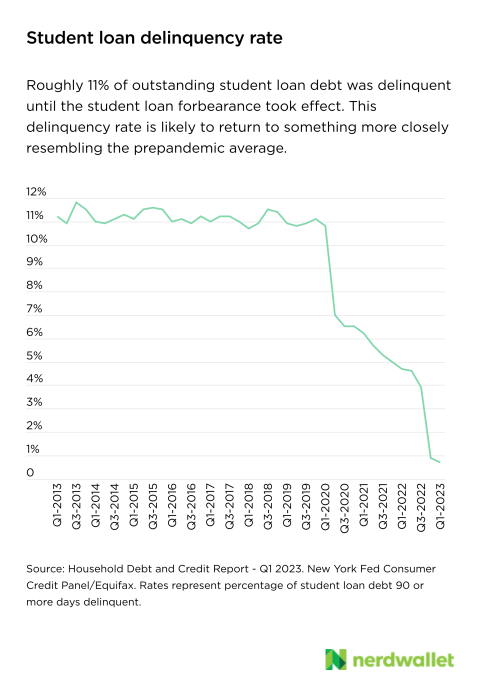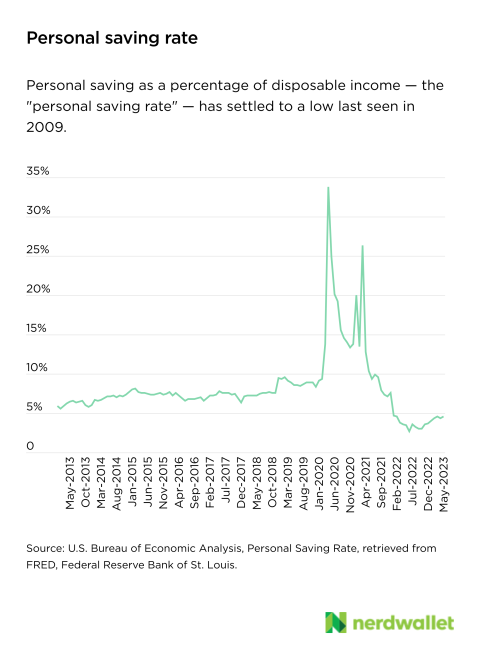By Elizabeth Renter | NerdWallet
After more than three years of an interest-free payment pause on federal student loans, millions of Americans will soon be on the hook for monthly payments. The effects could be felt across the economy.
How resuming payments will affect a single borrower varies widely, depending on, among other things, whether they stopped making payments at all, how much debt they have, the repayment program they’re in, and their current and future expected income. It also depends on the other expenses competing for a piece of their monthly budget. Because so many people are affected — 43.6 million people hold federal student loan debt, according to the Department of Education — the impact to the economy stands to be broad even if some borrowers don’t have a difficult time adjusting.
Currently, there is $1.6 trillion in federal student loan debt outstanding, according to data from the New York Fed’s first quarter Household Debt and Credit Report. This will come down by at least an estimated $39 billion (about 2.4%) before repayment begins, as long-time debtholders who have been paying for 20 years or more stand to have their slates cleared in a one-time adjustment recently announced by the Biden administration.
The White House is also implementing a repayment plan that could significantly reduce the monthly payments due for some borrowers, and a 12-month “on ramp,” where debtholders who enter repayment in coming weeks will not face repercussions for paying late. These two efforts alone could soften and slow the economic effects of those reentering repayment.
There’s little doubt that potentially hundreds of billions of dollars in consumer debt coming due will impact the economy — it represents debt held by roughly 17% of American adults and is the second-largest source of household debt, according to the NY Fed report. But the gravity of this impact is yet to be determined and likely to play out over the next several months and years. Here are four potential economic outcomes I’ll be watching for in the coming months:
1. Student loan delinquencies will rise
In the first quarter of 2020, nearly 11% of student loan balances were 90 or more days past due, according to the Household Debt and Credit Report from the New York Fed. The payment pause cleared this slate, and delinquency stands at less than 1% as of the first quarter of 2023. That will change. The 12-month on-ramp plan that promises to not penalize late payments will delay this impact, but there’s a good chance that at least some of those who struggled before the pandemic will soon find themselves back in a familiar situation.

2. Consumer spending will slow
Pandemic relief payments and forbearances on mortgages and student loans were just a few of the factors that led to households having more to spend during the pandemic. Money that may have otherwise gone to student loan debt could be used for home repairs, clothing, or entertainment and travel after pandemic restrictions were lifted. This robust consumer demand has played a role in higher-than-comfortable inflation rates over the past few years.
The return of a debt obligation means some households will have to rein in their spending once again, and consumer demand will likely fall.
3. Savings will remain low or fall further
The personal saving rate — a percentage of disposable income that people are able to set aside after taxes and expenses — rose significantly, hitting 34% early in the pandemic, but is now at the lowest since the Great Recession, at 4.6%, according to the Federal Reserve Bank of St. Louis. With student loan debt payments coming due, this rate will necessarily decline for those affected households.

4. Delinquencies across debt types may rise
Borrowers on a student loan payment pause “sharply increased mortgage, auto and credit card borrowing,” a new working paper from the National Bureau of Economic Research reveals. Credit card balances initially fell in 2020 as relief payments came in and fewer debt payments went out, but that reduction in balances was ultimately undone. Overall, those balances were 10% higher by the first quarter of 2023. And it wasn’t just on credit cards that balances grew. Total debt balances grew by 19% from 2020 to 2023, compared to only 12% from 2017 to 2020, according to the Household Debt and Credit survey.
The increased liquidity, or available cash, in households with paused student loan debt may have gone toward home or auto down payments they previously struggled to afford, according to the NBER paper. Now, having to return to regularly scheduled student loan obligations after three years without payments could leave some new homeowners (and additional debtholders) strapped. Though the total share of delinquent debt balances fell from 3.2% to 1.4% in the three-year forbearance period, representing a difference of about $215 billion, it’s likely this will ultimately settle closer to the pre-pandemic rate.
How borrowers can cope
If you’re worried about your ability to make full student loan payments once the forbearance ends, the 12-month on-ramp period will save you from default, so consider easing back into full payments if it’s helpful. But remember, your loan balances will accrue interest during this time, so the sooner you can make full payments, the better. If your payments are simply too high to manage, contact your loan servicer; an income-driven repayment plan may be a good fit, and a new one is set to launch this fall.
More From NerdWallet
